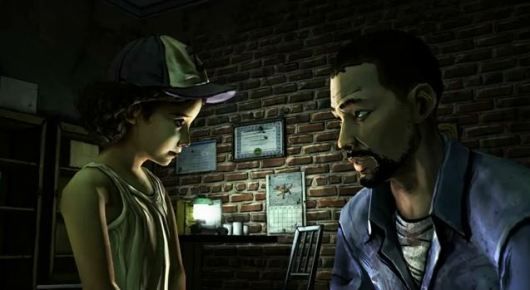Trending
Opinion: How will Project 2025 impact game developers?
The Heritage Foundation's manifesto for the possible next administration could do great harm to many, including large portions of the game development community.
A call to abolish "game over".


The Walking Dead
But a lot of games boast about how the choices you make affect gameplay. Yet from what I can tell, the more important the player’s actions are during a game, the less important any action is. The developers are forced to make sure that every option has an equal gameplay experience so your choices rarely have any consequence rather than the color of ninja you fight.
That’s why I’m so rarely worried about anything I do during a game. If I lose and get a game over, I’m back to five minutes earlier and suddenly everything’s fine. The best tension in games comes from threats other than losing the game.
That’s why Telltale’s The Walking Dead is such a wonderful game. Because everything you say and do has real consequences. If the player does or says the wrong thing, people turn against each other or against the player or they die. In the first and second chapter I was constantly trying to take the middle road so I didn’t anger the group. But my wishy-washyness just upset everyone anyway so in the third game I took a more direct approach to choices and I got someone killed because of it. My head immediately went over all the things I could’ve done differently to save them but it was too late.
That’s how you give players consequences to things they do.
“Game Over” as a mechanic has been on it’s way out for a long time now. Most games allow the player to immediately start over at whatever fight they lost. These days the only fear players feel about losing is that they’ll have to watch five minutes of cutscenes to get back to the boss. I’m not saying players should be punished for losing, that’s just a bad idea, but at the same time, players should feel that there are consequences for what they do.
The Game of Thrones videogame fails because it lacks the shifting levels of power that are in the series and books. The player knows that they’re always going to be the ones to win the fight. The player has to be the one to win because if they don’t the game stops. Why not phase out game overs entirely? If the game doesn’t stop when the player loses, there can be real consequences.
The player stops thinking “If I lose, I’ll have to try again.” and starts thinking “If I lose they’ll burn down the orphanage.”
Heavy Rain didn’t have a game over system either. If your character died, the story would continue on without them or their help. If players screwed up enough, the killer would just get away or the little boy would die. The player had the implication that everything they did mattered and because of that, they constantly felt that they had to do their best. The tensest moment I had in the game was when I was performing CPR on the drowned Shaun and I was terrified I didn’t make it in time.
The player shouldn't feel tense all the time when you're playing games. Like all good stories there should be an arc of rising and falling tension, the player shouldn't feel constantly stressed. The Walking Dead succeeds so well because of the quiet moments where the players learn more about their companions and chat with them about their homes and what they want. The player should feel that their decisions are important and in the Walking Dead they do feel important, life and death have the proper weight. That's quality storytelling.
But what about the game part?
A lot of this has been focusing on the interactive story aspect of games rather than the gameplay. The idea is that the game doesn't stop on a loss but instead takes the story in a different direction. The concept can be applied to a variety of genres and there are a variety of games that do this very well already!
Look at the Total War series as opposed to Starcraft. In Total War you don't have to win every single battle to win the game. You lose troops and territory and the game continues. You may lose your general during a battle and if you like him enough or put enough training into him this may be a major loss! If the player wants to keep the general they'd play differently, more defensively. Whereas in Starcraft, if the important units die, the level starts over. When games have different conditions than just win or lose, the game changes dramatically.
The middle ground of this would be Fire Emblem. In each level, characters that die stay dead but there are still lose conditions that would cause the level to have to be restarted. And of course many players simply restart when any ally dies. In that case it simply becomes another loss condition. Otherwise, the player is forced to make dynamic choices in battle. "I could finish this battle easily but I'd have to sacrifice one of my characters, and I really like that guy."
Obviously not every game could handle the freedom this presents. There are only so many ways you can justify having a main character lose a life or death fight and still survive after all. But by incorporating a bit of freedom into the system, the player can feel much more involved in the game, and isn't that what so many games are striving for these days?
You May Also Like